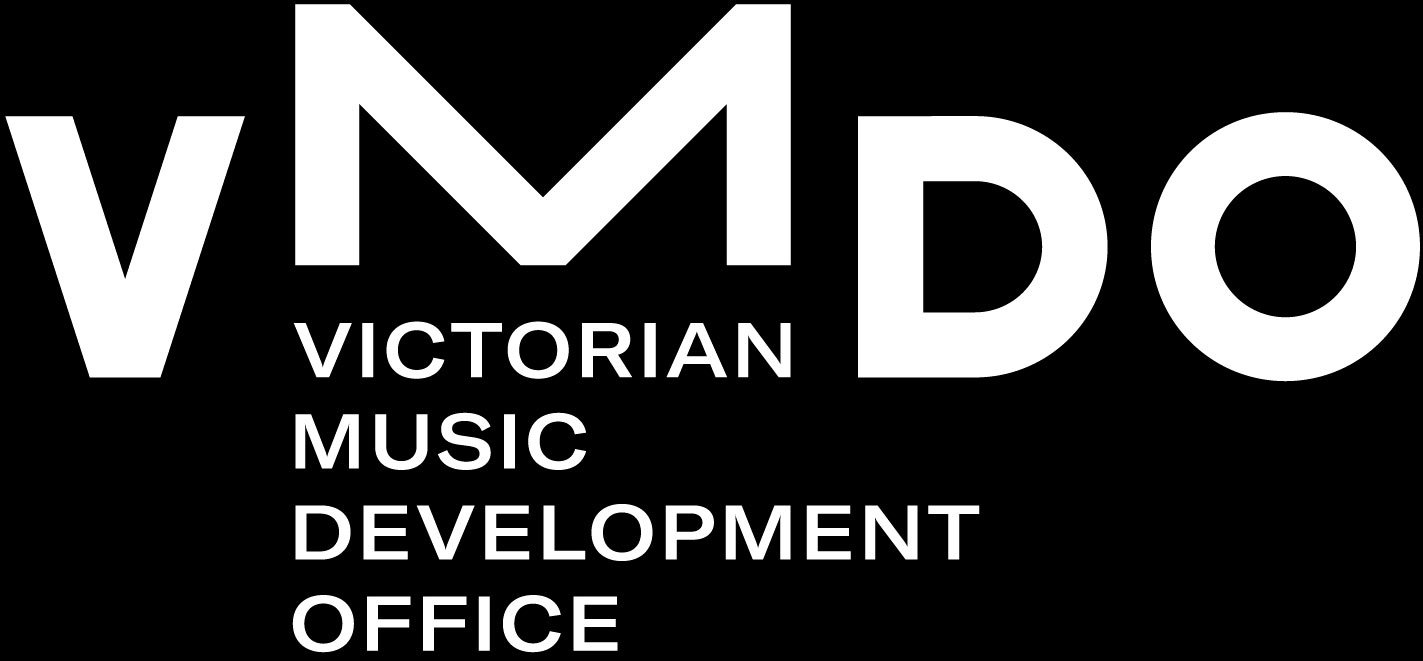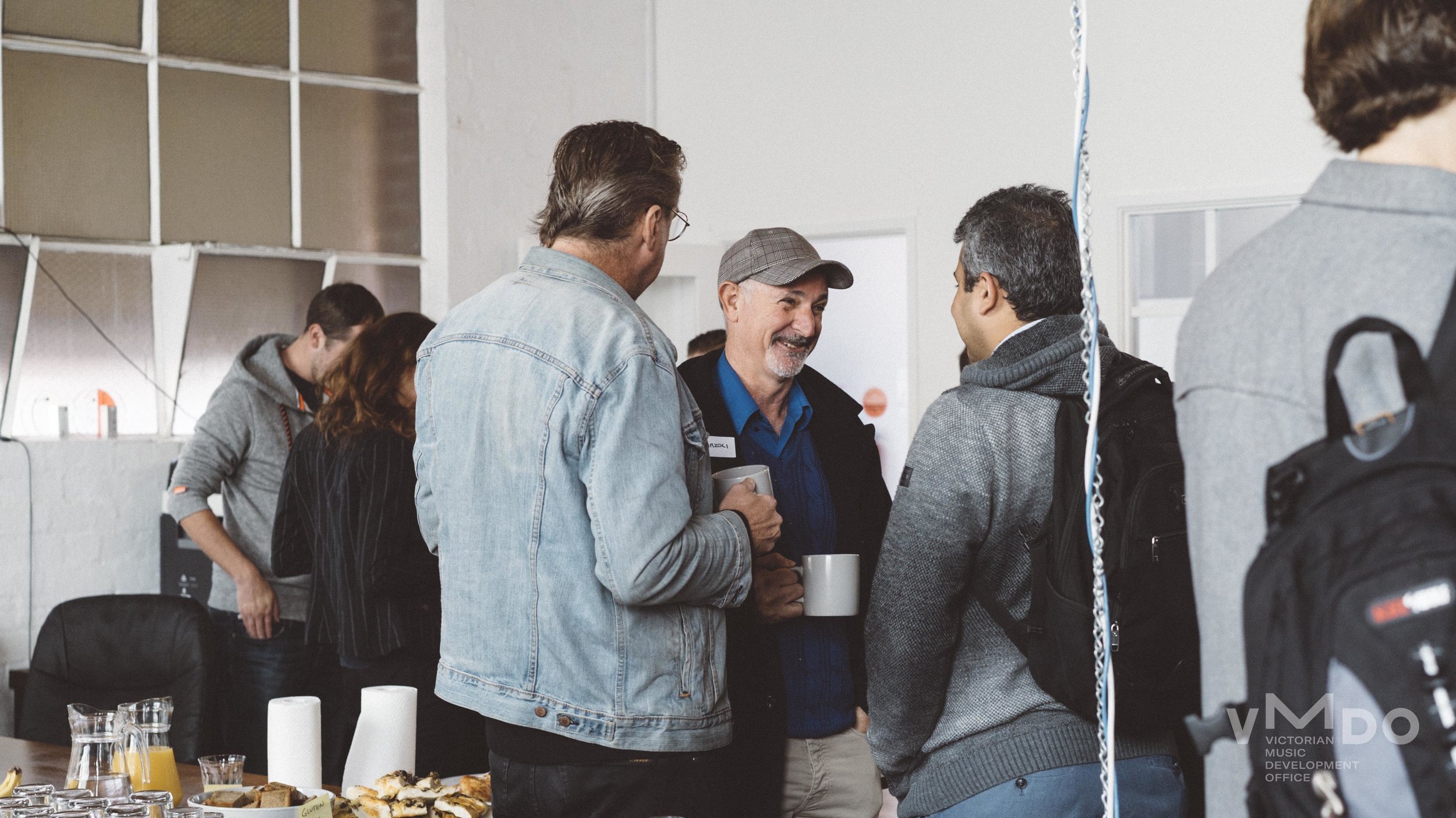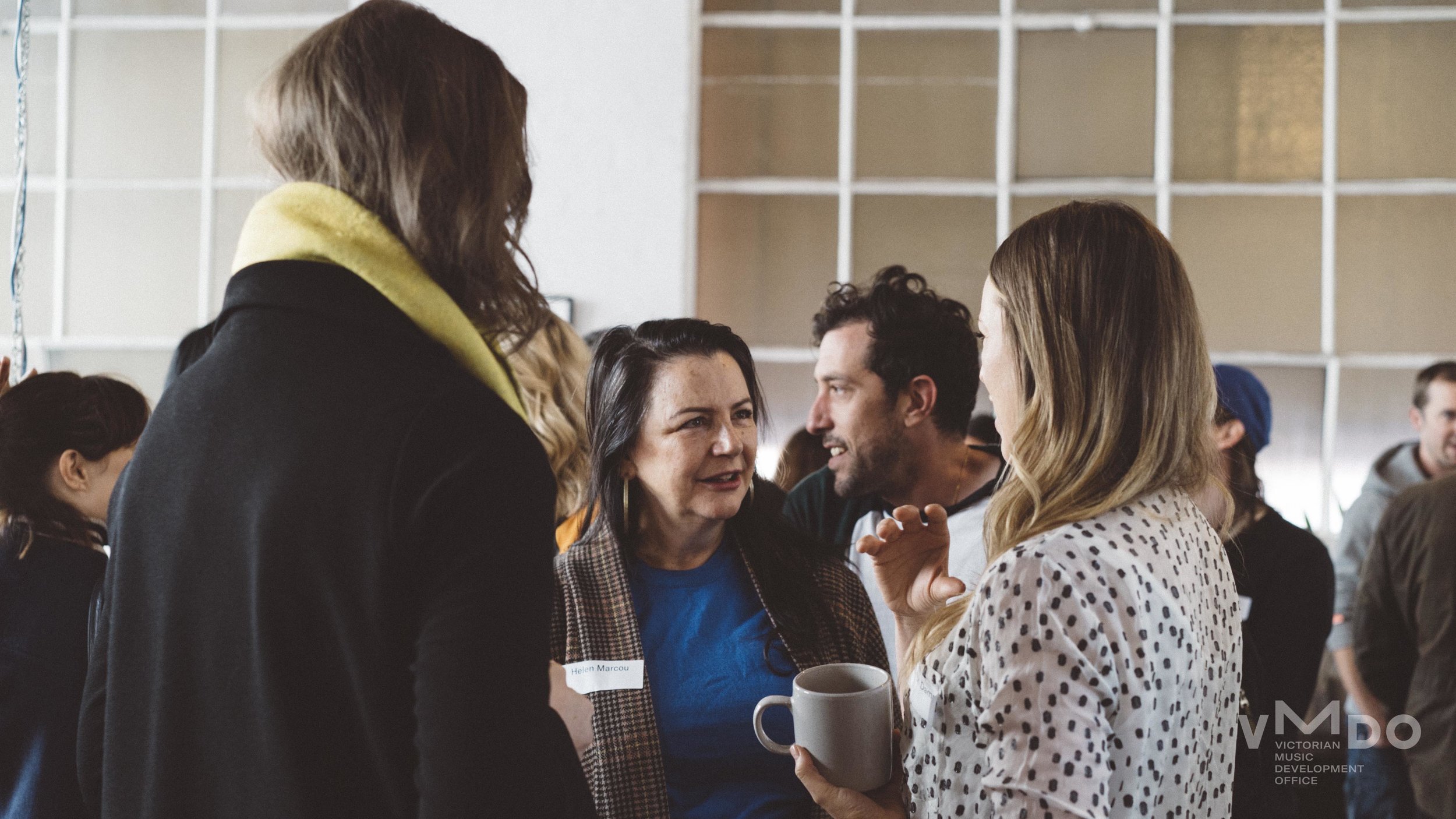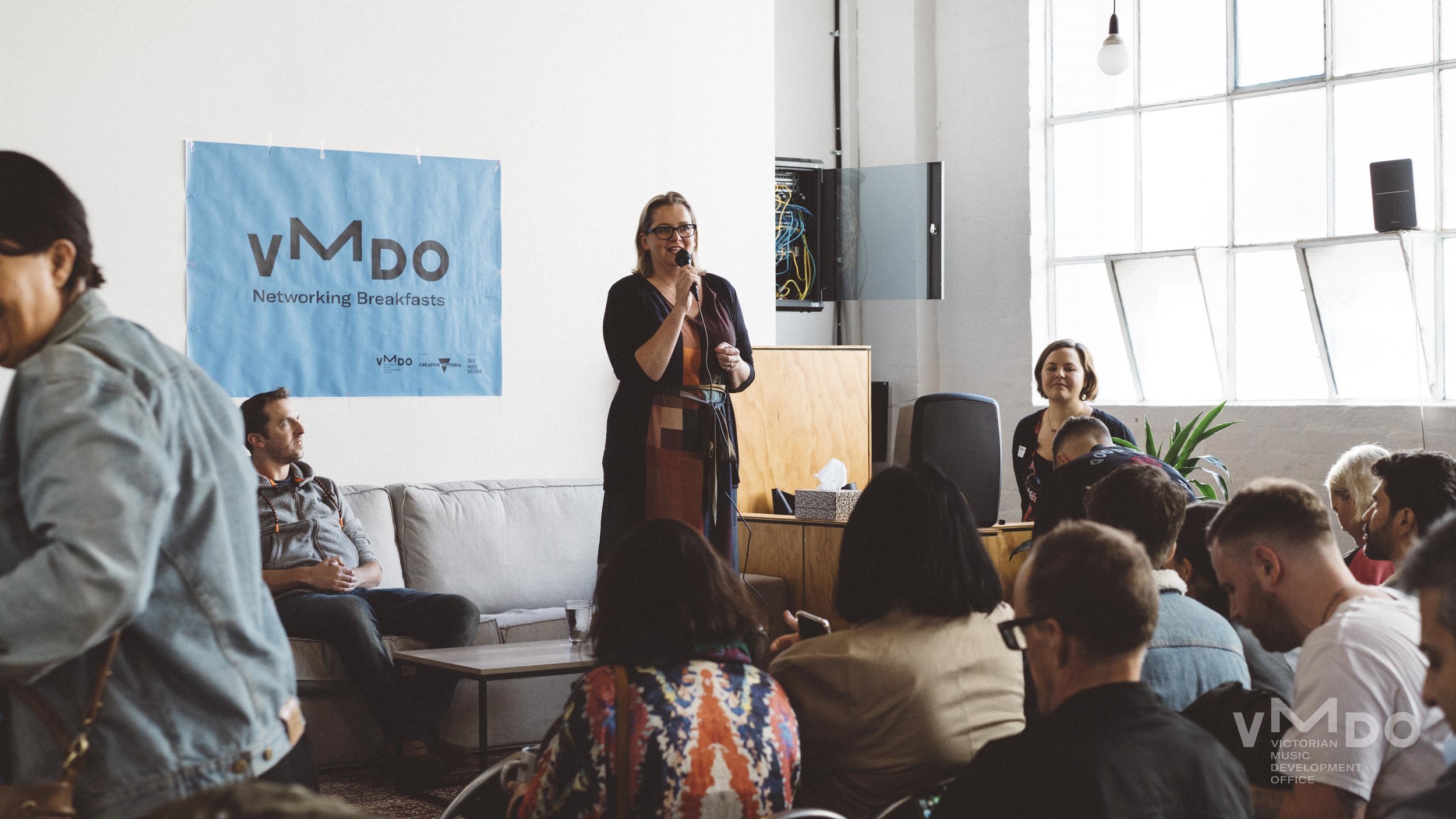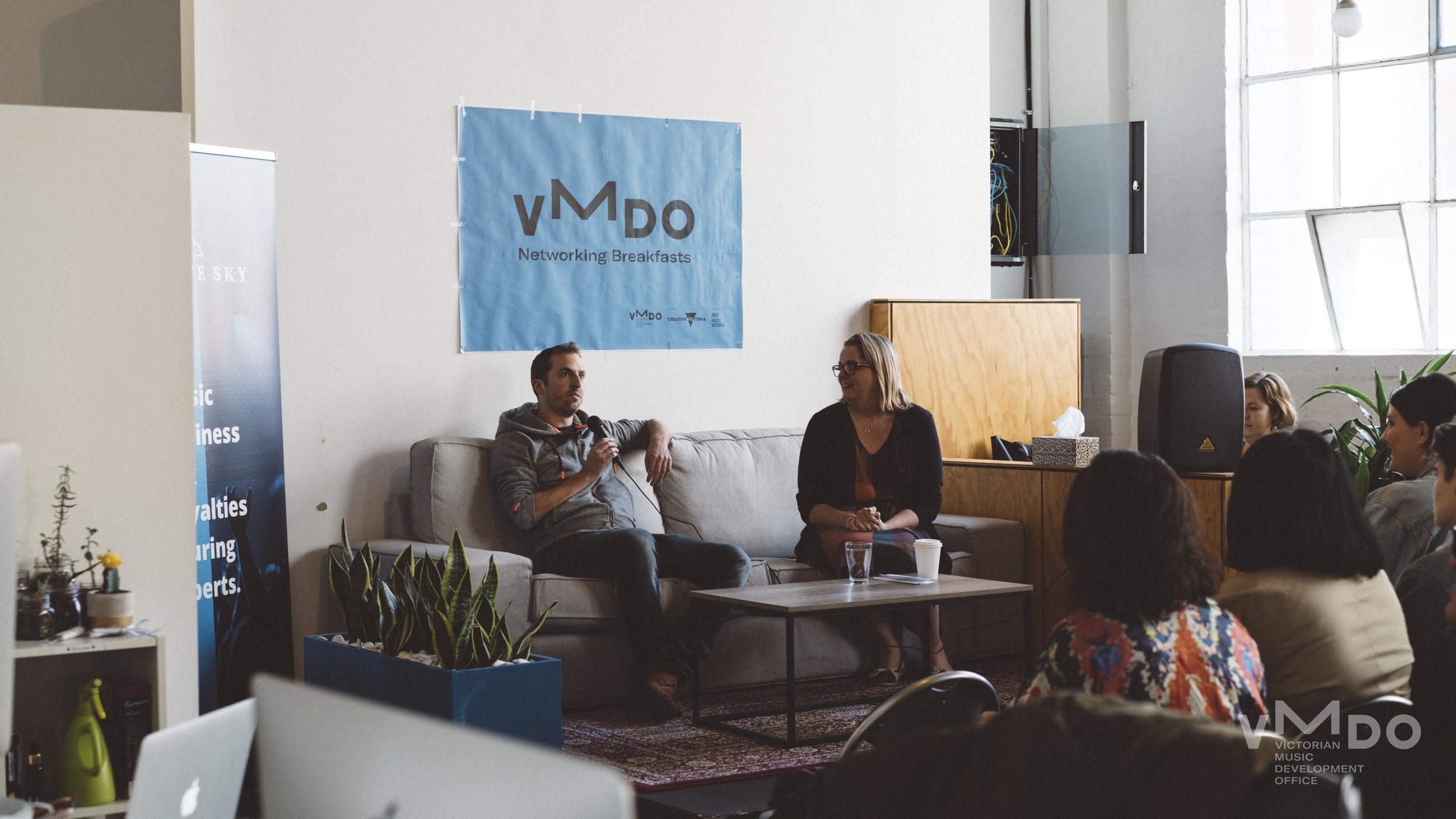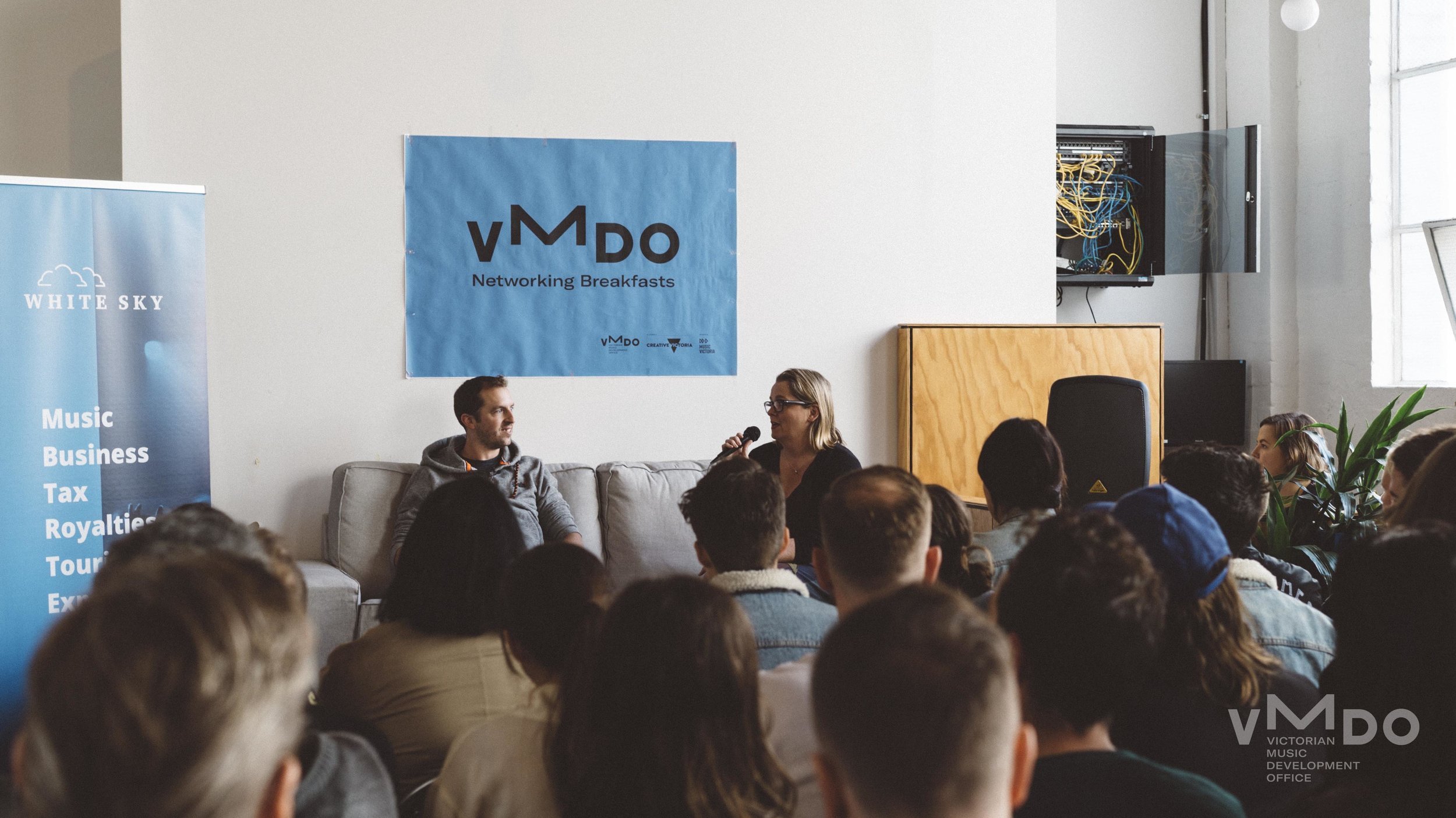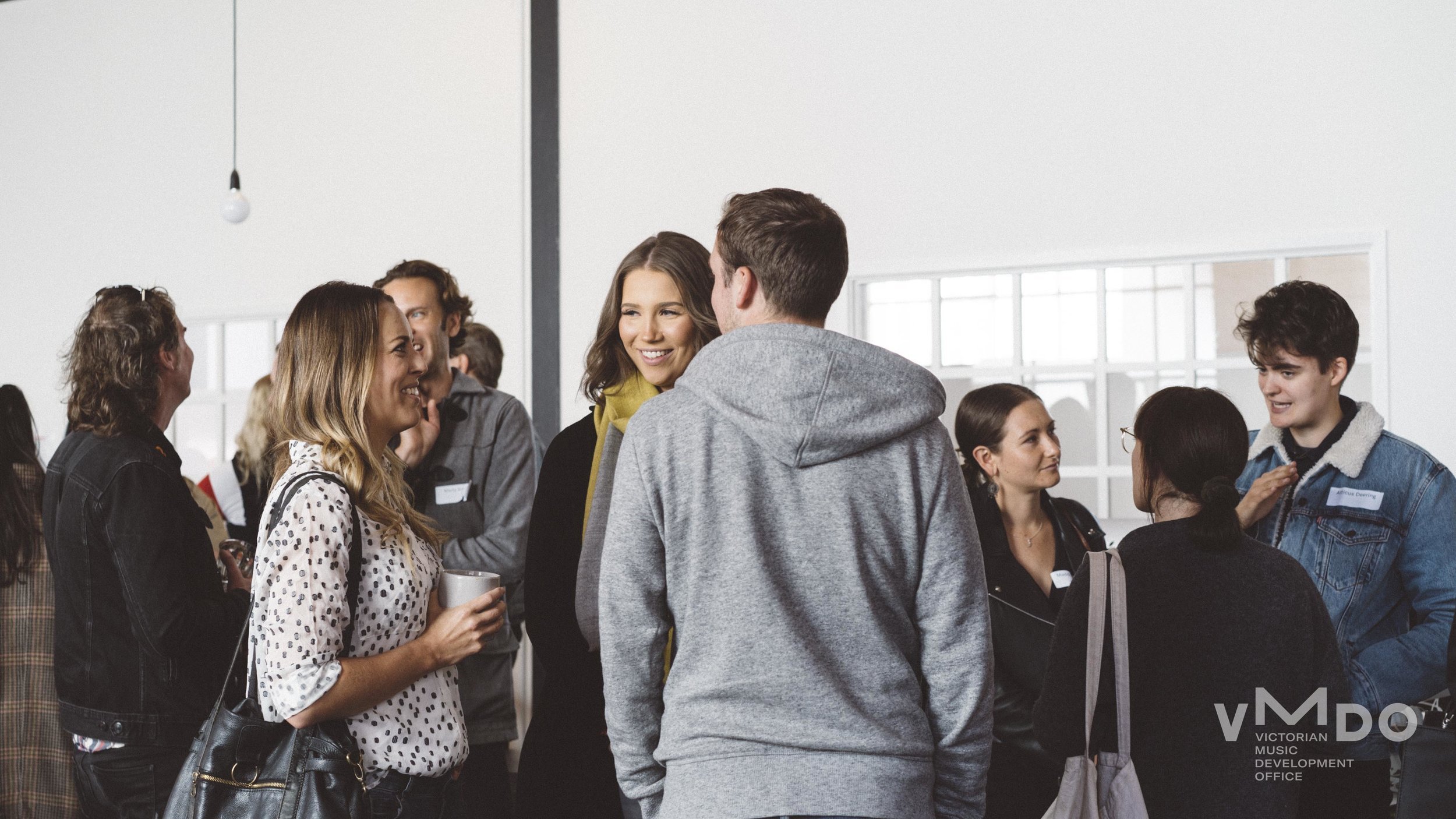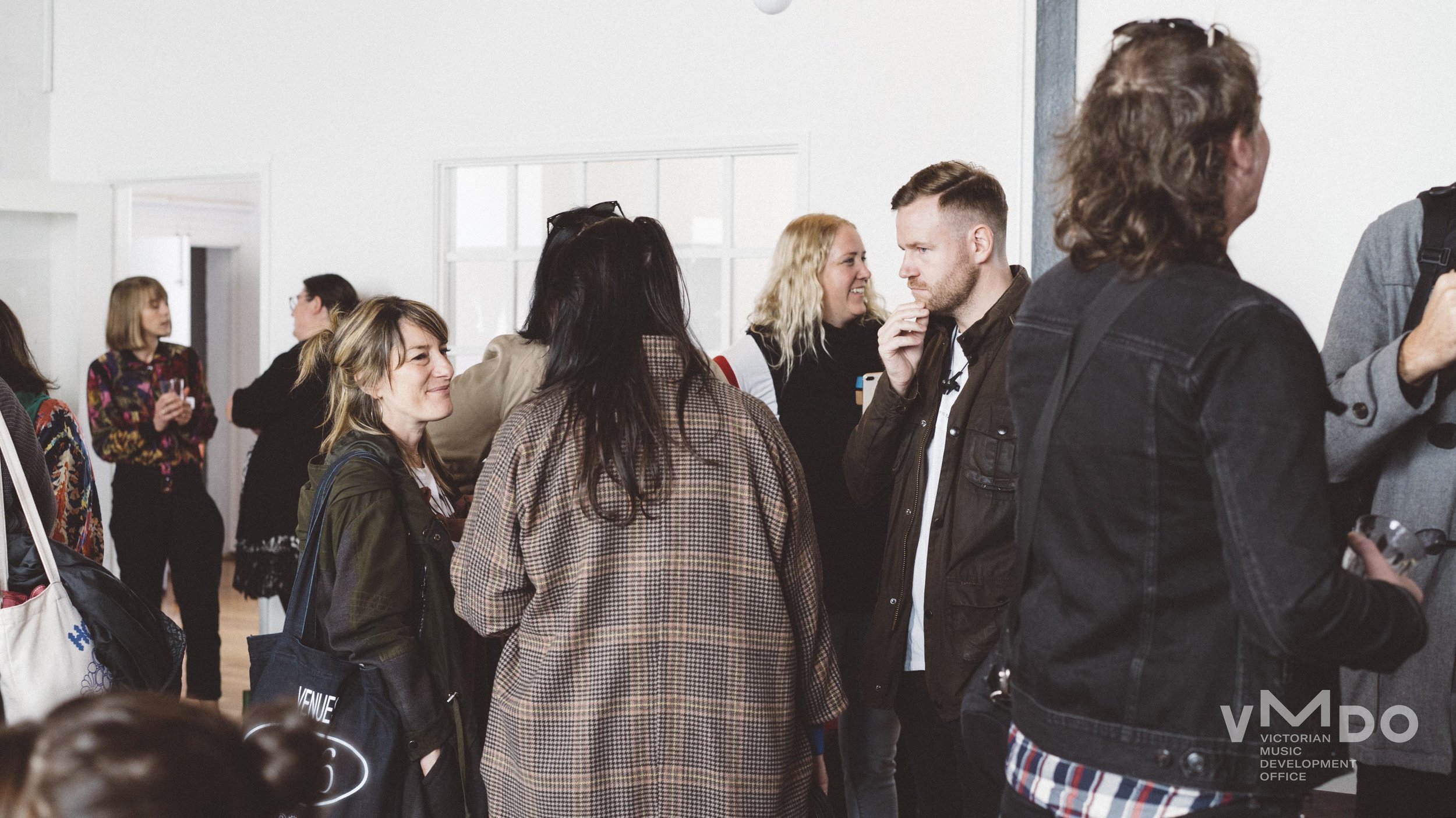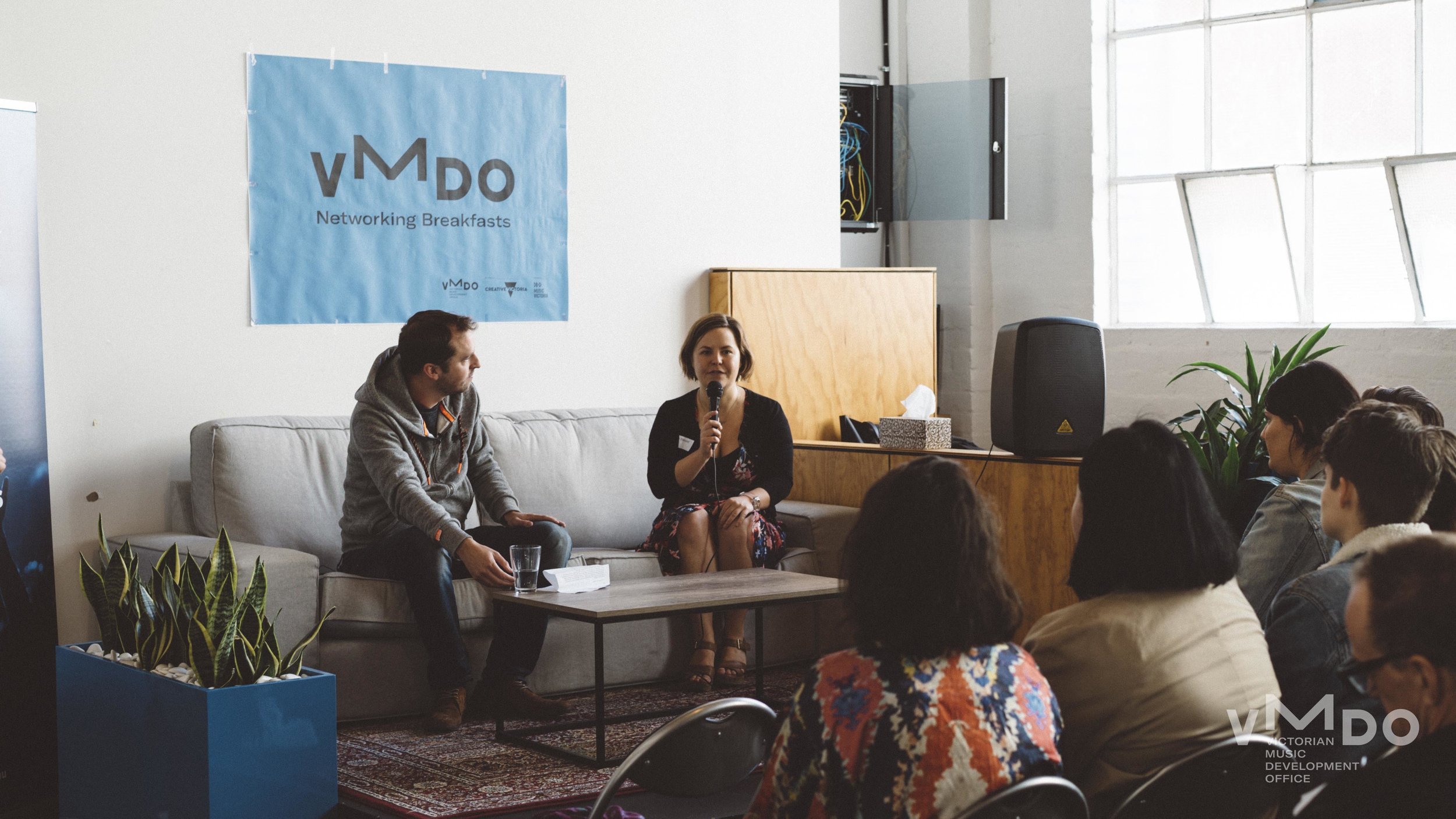VMDO - Networking Breakfast #4 Recap
L-R: Chris Carey, Bonnie Dalton
Source: VMDO; Photographer: Sianne van Abkoude
Published 9 April, 2019
Date: Tuesday 2 April, 2019
Location: White Sky Hub, Collingwood
Speakers: Chris Carey - Media Insight Consulting (Founder & CEO), Bonnie Dalton - Victorian Music Development Office (General Manager)
This April, VMDO Networking Breakfasts hosted Chris Carey, Founder and CEO of leading boutique research company, Media Insight Consulting. Chris specialises in data analysis, consumer insight and strategy consulting, with a client list including leading music companies such as Sony Music, Spotify and The O2 Arena in London. Chris also founded the FastForward music conference that takes place in Amsterdam, London and Sydney.
Key discussion points:
1. Data and the music industry
2. Technological disruptions and global trends
3. Upcoming VMDO Consumer Research study
1. Data and the music industry
a. The value of data
Having once been very cynical about data, the music industry today has an appreciation of the value it can bring, and how it can influence decision making. Ironically, with so much data now coming from Spotify, Apple, Social Media and more, there is a now significant risk of ‘analysis paralysis’ nowadays, where people feel they can’t act without data to back them up. Sometimes data is incredibly useful, other times its alright to trust your gut.
First thing to note; data doesn’t have answers if you don’t have questions. It’s very possible to stare at data waiting for some deep revelations, but without a hypothesis to test, data is far less powerful. If you do have questions, data can guide you to insights and quirks you couldn’t have found in isolation.
It’s also important to note that data can be used incorrectly by well-meaning people. Throwing a predictive statistical model that worked in finance at a music data set isn’t necessarily going to prove valuable, and it’s important not to see data analysis as a flawless crystal ball. As with many things in music, our understanding is incomplete. As such, if the data doesn’t accurately represent the situation, is alright to ignore data sometimes.
Lastly, there are some decisions data should not make. It just isn’t equipped. This can include innovations that are unprecedented, or an A+R decision where music matters more than statistics.
Data is a follower, not a leader. It looks at itself and makes predictions based on the past. You sometimes need a person to bring in what data can’t see. Data can’t identity the raw potential in an artist that a person could.
There is such a wealth of data available pertaining to the music industry, and some services use it very effectively to serve you music you might like, based on your historic listening.
One risk is that that the algorithm recommends what it knows you already like, and as such a purely data driven approach to curating music can narrow someone’s taste, as it’s unlikely to produce super remarkable music, and the music industry should be aiming for exceptional.
It’s hard for music companies to take a holistic view of the music when focusing on data. There is a lot of nuance to the music industry that cannot be quantified within data. For instance, if a band doesn’t have many likes on Facebook, that does not mean it’s not a good band, though data instead would see a band that may have no social media likes and assume it’s not a good band. Social media likes isn’t the best projector for a young band.
b. Is there a risk that data further excludes marginalised groups?
Data is good at the middle ground, it’s not so good at the fringes. If we take averages more often than not, we marginalise. Representation is a concern when it comes to auto generalised playlists (which naturally tend towards the middle ground).
It’s important to have representation in all aspects of the music industry, but data does pose a risk to representation of marginalised groups, especially if a person's status cannot be quantified in data.
Say you have a roster that has five distinct groups, if instead of comparing those to an average, you compare them to the average of each other, you get much more meaningful insight because it’s not clouded by other, less relevant things.
2. Technological disruptions and global trends
a. Disruption
Technology is a disruptor in music, but it’s par for the course. There’s good and bad disruption. Selling something valuable too cheaply isn’t good disruption. There’s disruption that brings value, for example. streaming, and its effect on piracy. It’s a disruptor with a long term plan to improve the music industry. But sometimes we put technological disruptors on a pedestal, not all technology is appropriate to apply to the music industry. Disruption alone is not enough.
b. Playlists and algorithms
When adapting to new technology, music industry professionals must consider algorithms. There’s a possibility that playlist algorithms could be a significant problem for artist development.
Playlist creating algorithms look back to predict future behaviour. They are very good at predicting what should’ve happened yesterday, they’re not so good at predicting what should happen tomorrow.
The essence of that decision is naturally historic, because they look at people like you, and in terms of encouraging you to branch out, algorithms will recommend what others like. It can bring really interesting music, but the incentive for a streaming service is to keep you inside their environment.
And there is a worry - because consumers have high expectations that recommendations will only serve them music that’s agreeable - that music can easily be forced to the middle of the road. Algorithms tend to make you more like everybody else. And that’s before we talk about writing for the format, so putting the hook early in songs to help the listener not skip the song.
And let’s not forget that music is competing with other forms of entertainment for consumer spend. If music is not exciting, how can the industry compete with YouTubers and Netflix?
The value of a risk-taking playlist filled with songs a listener may hate, but one song they completely love, cannot be underestimated. Playlists should also be a place where one can discover something exceptional.
There’s a risk that playlists are much like Tinder. Before a listener can engage further with one artist, there’s something new and shiny being shown off, making it harder to have a deep relationship with an artist. And you need that depth to maximise your streaming revenue, from tickets to vinyl’s.
c. Artificial Intelligence (AI)
As AI becomes increasingly commonplace in the music industry, the risk is that it’s pushing towards playlist friendly music for background noise. And though there’s nothing wrong with background noise, there needs to be more variety, and that requires a human element. AI works much like playlist algorithms, calculating what is popular and moving forward from there.
d. Blockchain
Though Carey is quick to say he’s not a coder, he also is confident that Blockchain is an inefficient database compared to a regular one. Trying to be balanced and not cynical, he does not anticipate meaningful change coming from Blockchain for a long while for the music industry. The music industry needs to sort out it’s metadata first, which is no small task!
Just because technology has worked in other areas, doesn’t mean it's appropriate to apply to the music industry. However it is a positive that the industry is looking to the outside and seeking for technologies to make the industry the best it can be.
3. Upcoming VMDO Study
Chris Carey and the VMDO will be working together over the coming months to facilitate a Consumer Research Project, gathering data from across Australia, which will focus on music fan habits.
The study will analyse how people discover music, what they do next, the format music listeners choose to purchase (streaming as well as Records or CDs), analysing by genre and demographic.
The study will also take a look a ticket sales, concert purchasing behaviours towards VIP bundles, merchandise, attitudes towards music etc.
This study will empower Victorian music industry professionals to better know their world, market, bands, in a way they cannot without this data. The study will help music industry professionals understand, not so much about predicting the future, but where the opportunities are that are not being noticed or made use of currently.
Currently some information is available to big businesses, but the data set to be curated over the coming months will be available to everyone in Victoria, through signing up with the VMDO.
Chris is excited about the research, as it will it provides a holistic view of the consumer in the way that singular services like Spotify or Apple cannot. Music industry professionals will be able to use the study to see consumers as individuals, separate to their behaviour.
When it comes to forecasting, Carey takes a relatively simple approach: if he can understand yesterday in complete detail, he can understand tomorrow much more cleanly. At the moment, his view on the present is incomplete as there is not enough information available. This study will allow a better view of the present as to better understand music fans as they are now, and give a basis to inform forecasts on key trends that will affect Victoria’s music industry.
Closing Remarks:
Chris Carey’s work with the VMDO will not serve as a crystal ball, but it will help music industry professionals understand where Victoria’s music industry is currently, and that’s a big step forward.
There is an opportunity to provide good, actionable data, made available to people on the coal face, making everyday decisions that shape the future success of talent coming out of Victoria is very exciting.
Interested in attending our next Networking Breakfast? Find out more here.
